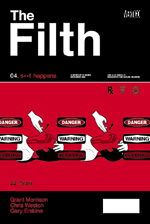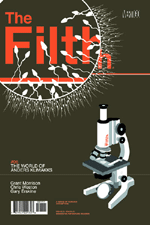Sex Toy Story | |

| Alan Moore said recently that he is studying magic in an attempt to find out why and how he writes, to learn something of the quasi-mystical forces that propel human beings to create these fictional illusions called stories. It seems that in his latest comic, fellow scribe Grant Morrison is attempting something similar. 'The Filth', his new title, seems to be very much 'about' fiction and why it exists. It engages with the idea that fictional characters are 'real', their unreality only enforced by the perceptions of comic book writers, artists and readers - something we may imagine that the fridge light thinks about the second before it's opened, or that our reflections consider before we look in the mirror. 'The Filth' is also mad. Totally, utterly, gloriously fucking bonkers. The 'Filth' of the title is a double meaning. Modern culture is seen as consisting pretty much solely of moral detritus. A chief character is a loner who hordes hardcore porn videos; a visit is made to a dimension where landfill sites are filled with dead junkies and discarded porn; and a porn video mogul enslaves any soul who comes his way in a bizarre and demonic plan to wipe out women. 'The Filth' also refers to the special police force whose job it is to sort out the kind of bizarre occurrences that help cause this filth, a group called The Hand (and their various offshoots such as Palm and Fist). They are not there to clean up the mess, per se, but to fight "potentially lethal anti-persons". Their concern is not that life be clean, but that it at least respects continuity. Everything must have its place, and before must come in front of after, and anything taken out of continuity prematurely must be 'replaced'. So far we're up to issue five in a thirteen-book series. The chief recurring character so far is Ned Slade, an agent of The Hand who is brought back into service only very reluctantly. There are ambiguous statements about his own 'reality' - "I don't want Slade's life! I'm not what you think I am. I'm not anything!" Investigating a series of inexplicable deaths (where time itself is used as a killer), he is prised away from his pet cats and porn videos and led into.... What? Future issues will tell, and we will also learn more no doubt about fellow agent Jenesis Jones. Her particular assignment is to piece back the memory of an amnesiac porn star who ejaculates black fluid. Quite. |

| In other words, it's a superhero comic, but not what is usually thought of by the term. 'The Filth', and Morrison's work generally, quite plainly has its origins in a boyhood love of costumed-superhero comics. He is amongst the most prolific writers of such books, but they are superhero books in the same way that William Burroughs' works were detective stories or sci-fi stories. In other words, he has fun with the superficialities of the genre, but stretches them to breaking point, mixing in a heady mixture of gallows humour, pop culture and psychotropic drugs. In fact, quite a few lines from 'The Filth' seem to come straight out of Burroughs. For instance, on the porn landfill, "Sometimes a worker will just go bugfuck and skin-eyed what with all the tits and cocks, and they try to climb towards the peaks, looking for harder stuff..." Morrison has dallied with some of these themes before. In an issue of 'Animal Man', a Wyle E. Coyote-style cartoon wolf fell out of favour with the God of his world, and, with one swoop of an animated paintbrush, he was sent to exist in 'our' world, where a cartoon talent to be run over by trucks 'harmlessly' was not without pain, or tragedy. In 'The Filth', a branch of continuity anarchists (no doubt Hand-opposed) play with the fact they can jump between their page panelled, four-colour dimensions. Their leader has been made bitter by realizing that his fate was once controlled by comic writers - he was just "playing out crummy meaningless adventures written by amoral monsters." If the comic is dealing with what could be probably be half-described as postmodern theories then, it doesn't feel it - wittily self-reflexive characters have been a stock of comics longer than in 'proper' literature. Passages such as the one above, especially in the laugh-out-loud Issue Three ('Structures and Ultrastructures'), have a tougher edge to the debate on what kind of 'reality' we allow our 'fictional' creations, most popularly voiced in of course 'Toy Story'. And I have to say, the fact that Morrison works all this into a fluid comic script, without using such clumsy devices as the inverted commas I've peppered throughout this article, just goes to show the man's apparently effortless talent at the typewriter. Grant Morrison has been quietly/loudly revolutionizing comics since his strips for Britain's 2000 A.D, and 'The Filth' is yet another success to his name, high on quality and almost (almost) peerless in his field. Go read it. © 2002 Dee Dee |